2013 & 2014
Ralph Page Dance Legacy Weekend, 2013 & 2014
2013 Weekend. In 2013 we had Bob Dalsemer and Nils Fredland calling with Old New England and Notorious playing. Tod Whittemore was back on staff for the Friday night dance, as were Calliope. The Retrospective featured square dances, and was led by Tony Parkes.
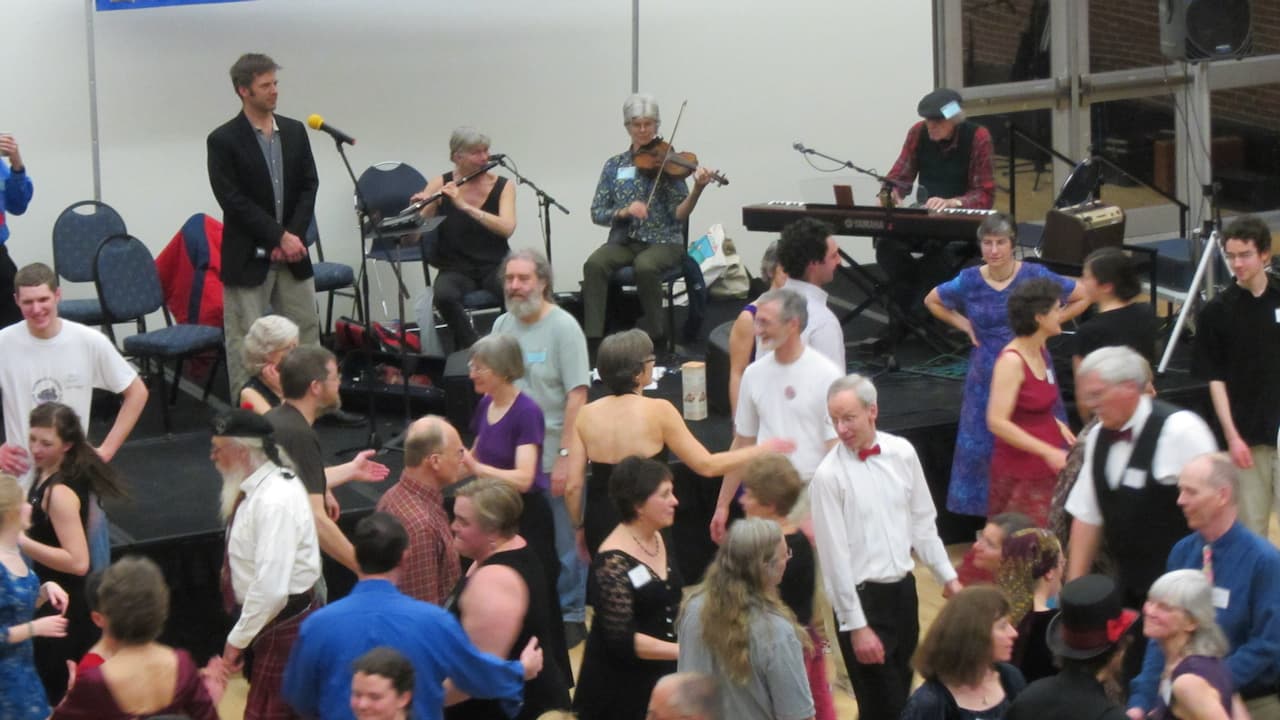
Old New England playing at the Grand Dance in 2013 with Nils Fredland calling.
Tod called many of the classic contras and squares on Friday night, including Lady Walpole's Reel, Crooked Stovepipe, Rory O'More, and the "Big Three": Smoke on the Water, Maple Sugar Gal and Just Because.
There were several other chestnut contras and squares over the course of the weekend, and Old New England always played in a classic New England style, but I remember that as one of the most modern of the weekends we'd had in terms of choice of dances; and Notorious was one of the most modern bands we'd had. I think it was around that time that I started referring to the weekend as one of my few annual visits to the world of modern urban contradancing.
2014 Weekend. The 2014 Weekend featured Dudley Laufman and Susan Kevra for weekend calling staff, and Calliope and Maivish for music. I believe that while Calliope had been the Friday evening band a few times this was their first time as regular weekend staff. It may also have been Dudley's first time as weekend caller although he'd certainly been at the weekend most years in a variety of different roles.
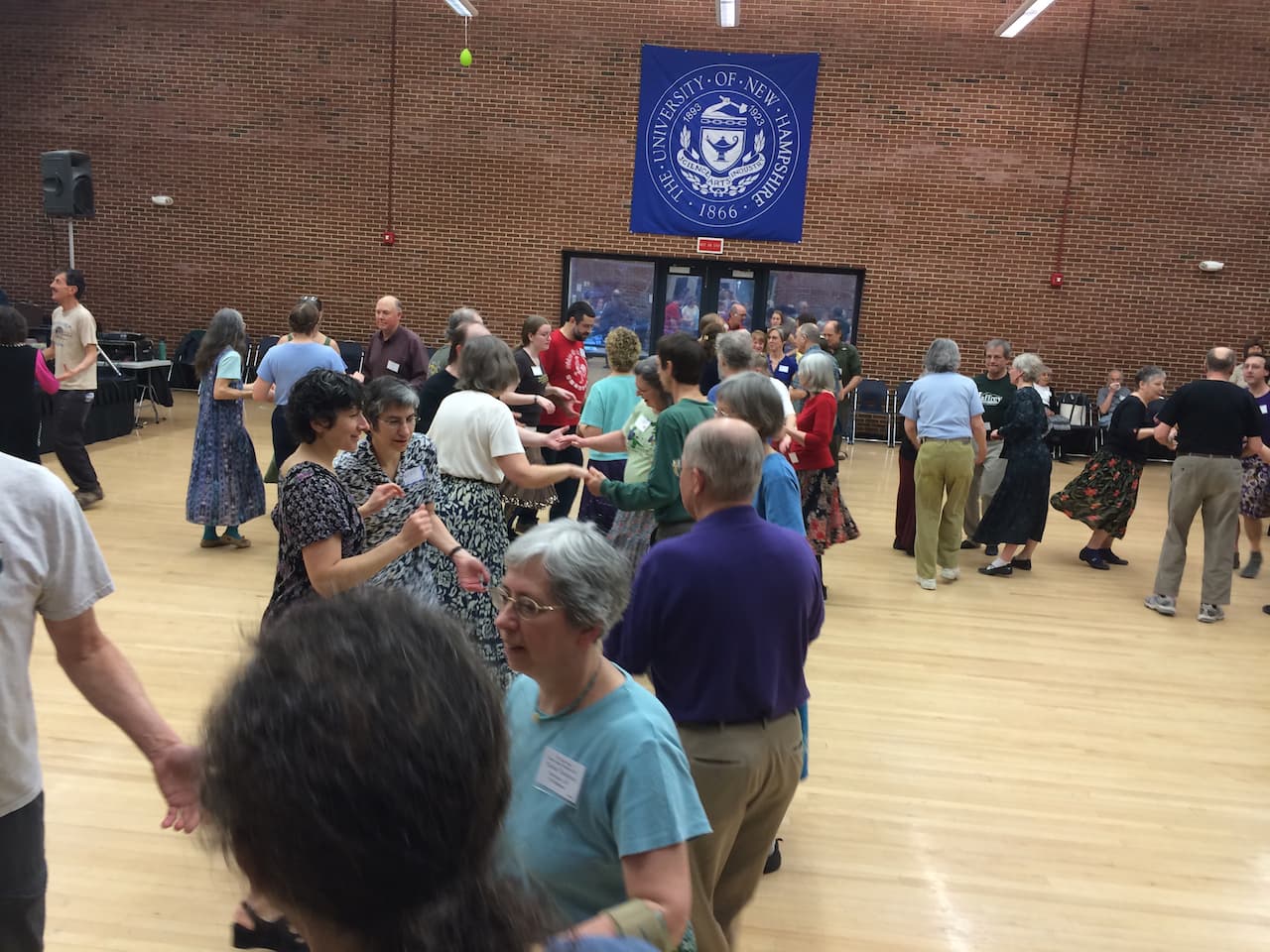
The daytime sessions are smaller so there's more room to dance. Callers often do interesting workshops and call dances they couldn't call in the evening. This dance is in a formation in which two contra lines are formed perpendicular to each other. Where they meet they form a square. People progress in and out of the square, often changing lines in the process. It's possible to have multiple contra lines meeting at multiple squares.
Dudley did a session called Ralph’s Tuesday Night Boston YWCA Dances at which he called the Monadnock Reel, Opera Reel, Swing Your Jenny, Lamplighter's Hornpipe and a set of three plain quadrilles. He also did a session of mostly lesser-known chestnuts such as Banks of the Dee, Honest John and Morning Star. Susan did a workshop linking contras with English country dance.
2015 & 2016
Ralph Page Dance Legacy Weekend, 2015 & 2016
2015 Weekend. The 2015 weekend callers were David Millstone and Carol Ormand; Mary Wesley called on Friday night as well. The Sugar River Band played Friday night. Riptide and Rodney Miller with David Surette and Gordon Peery were the weekend bands. The Retrospective celebrated 100 years of CDSS.
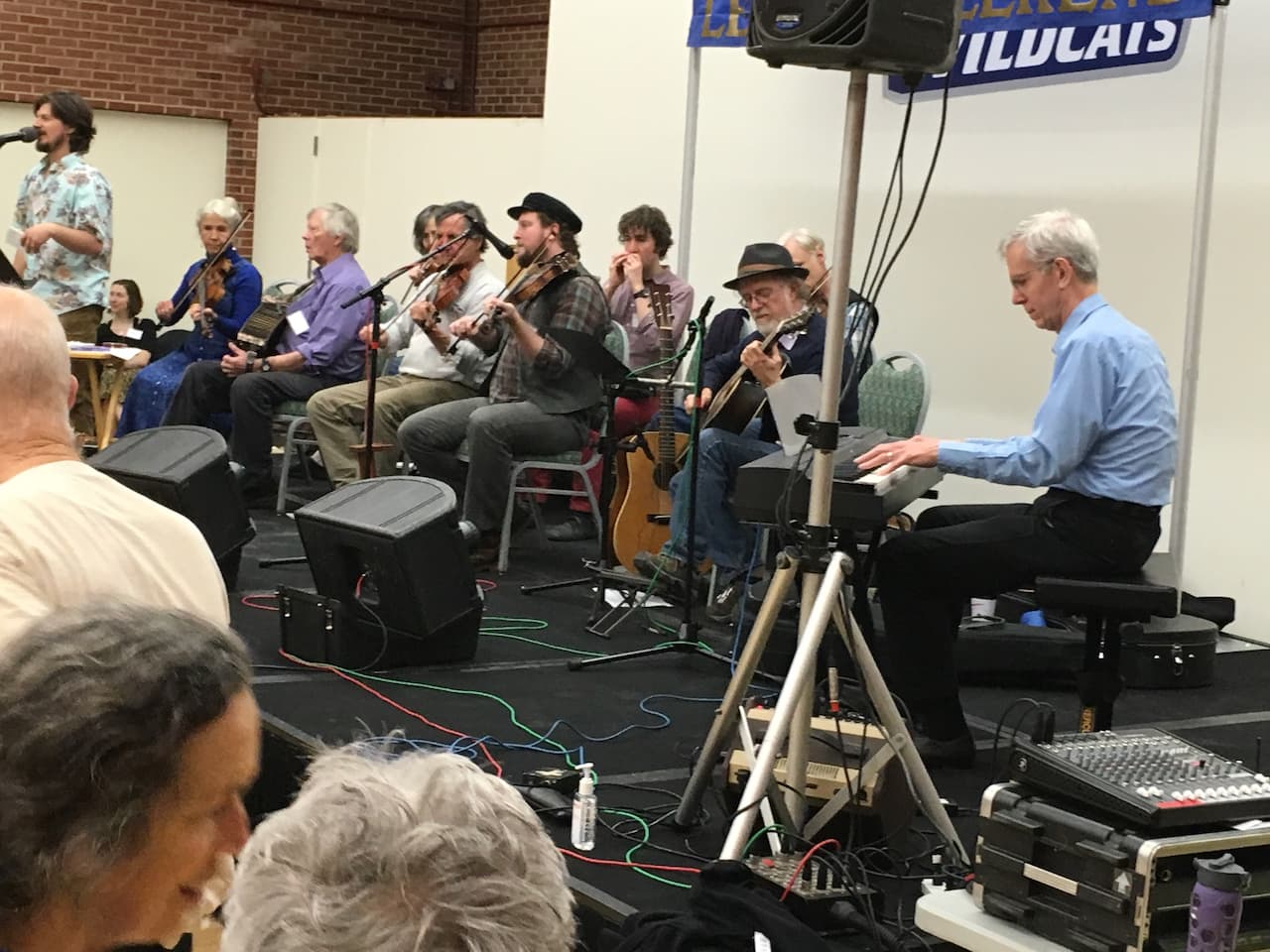
Jordan fiddling, David Eisenstadter calling, and a large sit-in band, including Dudley and Tony Parkes (2016 Weekend).
Bob McQuillen died shortly after the previous year's Weekend. He had been on staff all but possibly one year, and was not exactly one to stay in the background. He always had something good to say about people, and was well loved by everyone. Thus, his absence was probably one of the most noticeable aspects of this Weekend.
The other thing I noticed was the further trend toward it becoming a more modern dance weekend. There were certainly still more chestnuts called, and a greater variety of workshops. But overall much of the dancing was more like what you'd expect at a regular dance than what I would expect at the Ralph Page Weekend. As an example of how these went together, there was a workshop on Triple Minor Contras at which only one traditional dance was called; the rest were modern and complex.
No More Syllabi. I am unable to find any syllabi later than 2015 in my collection, and they haven't been put on the website of the NH Library of Traditional Music and Dance where all the others are. My understanding is that none have been prepared since then, or at least not to the point of completion. So my accounts of more recent Weekends will be rather sparse.
2016 Weekend. The weekend callers were Chrissy Fowler and Tony Parkes; David Eisenstadter called on Friday night. The bands were Old Grey Goose and Pete's Posse. Friday night Jordan Tirrell-Wysocki played with Jim Prendergast.
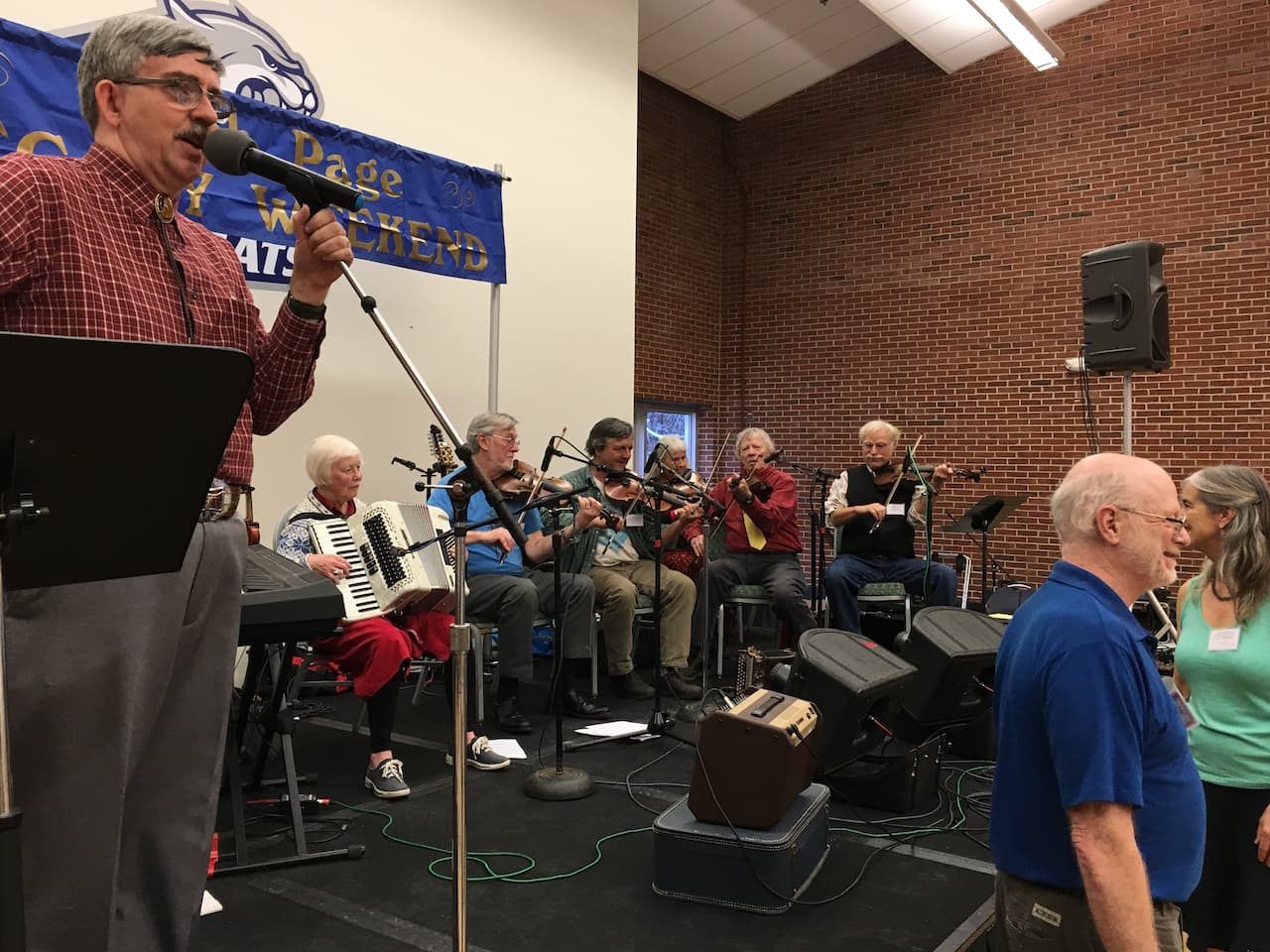
Adam Boyce in his role as Ralph Page (2016 Weekend). Old Grey Goose is playing, with several sit-in musicians from the Canterbury Orchestra.
My memory is that the everyone was impressed by Jordan's music. It was fun, danceable, interesting, overall excellent. Old Grey Goose of course was excellent as well. I know that many people enjoyed Pete's Posse, although they were a bit modern in style for my taste.
This year went against the trend toward modernization overall though. Chrissy and Old Grey Goose did a session of the music and dance of the Overlock Orchestra that played for Maine dances early in the 1900s, and it was a lot of fun. Adam Boyce did the Retrospective which was a Ralph Page dance. Adam had been doing presentations in which he played the role of Ralph Page, and he did that here, and very nicely. Emeline and I did a workshop on the Tunes of the Ralph Page Orchestra which went over well.
2017–2019
Ralph Page Dance Legacy Weekend, 2017–2019
2017 Weekend. This was the 30th Ralph Page Legacy Weekend. Instead of having a Retrospective, much of the weekend in effect was a Retrospective. We had a large variety of musicians and callers. Musicians included the Canterbury Country Dance Orchestra, Liz and Dan Faiella, Calliope, Jumpstart, George Wilson & Selma Kaplan the Sugar River Band with Deanna Stiles, Sylvia Miskoe, Emeline Dehn-Reynolds and me and others. Callers included Dudley Laufman, Adina Gordon, Mary Wesley, Jeremy Korr, Lynn Ackerson Tony and Beth Parkes, David Millstone, David Smukler, Mary DesRosiers, Tod Whittemore and others. There were sessions of dances of Ralph Page and Ted Sannella, classic contras and squares, triple minor dances and more. Overall it was a well attended and successful weekend.
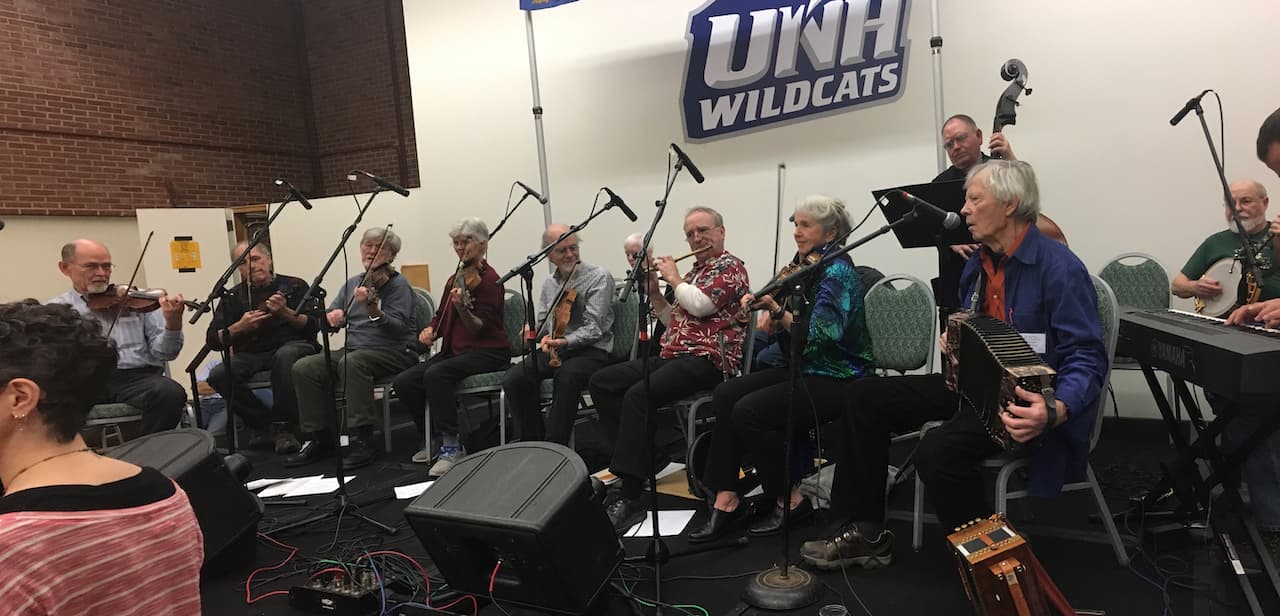
The Canterbury Country Dance Orchestra playing at the 2017 Weekend. Rather to my surprise I took two photos of the band, asked Photoshop to turn them into a panorama, and it worked nicely.
Out of the Blue … Shortly after the weekend was over I received a call from the president of NEFFA (Tee Huffaker) who informed me that she was kicking Emeline and me off the committee. I was unable to get a clear reason out of her. She seemed to be saying that my long history with the Weekend was the reason, but didn't explain why that was a valid reason. My attempts at communication were largely ignored; a politely written email attempting a friendly resolution received no response. My impression is that she wanted to make changes to the weekend that she thought Emeline and I would object to. The president of NEFFA is the president of all committees, so there wasn't anything we could do.
Thus ended one of the major parts of my life since the early 1990s. I'm still sad about it, although I admit it's nice to let others do the work. I was asked to join the Committee by Ted Sannella after doing publicity for a few years and having extensive correspondence about dancing with him. After he was gone I tried to keep my understanding of his vision for the Weekend alive and to pass it on to new Committee members some of whom were fairly new to this style of dancing. As I think back on it, I'm proud of the work I did for the Weekend and I'd like to think that Ted would have been glad he took a chance on me.
I hope that the current committee, whose composition I don't entirely know, takes good care of the Weekend as it has been unlike any other major dance event that I know of and has done a lot to keep alive the traditions on which our music and dance are based.
2018 Weekend. Mary DesRosiers called Friday night with Julie Metcalf, Laurie Andres and Conor Sleith. Mary is an excellent caller, and the music was good. The Weekend callers were Lisa Greenleaf and Steve Zakon-Anderson. Keith Murphy, Becky Tracy and Andy Davis played, as well as the Sugar River Band. I have no listing of dancing, but the dance sessions tend toward the modern side. The Retrospective was "Tunes and Tales of Bob McQuillen" with Sarah Bauhan as the moderator. It was good to honor Bob, but strangely the Retrospective was put up against a dance session for the first time ever.
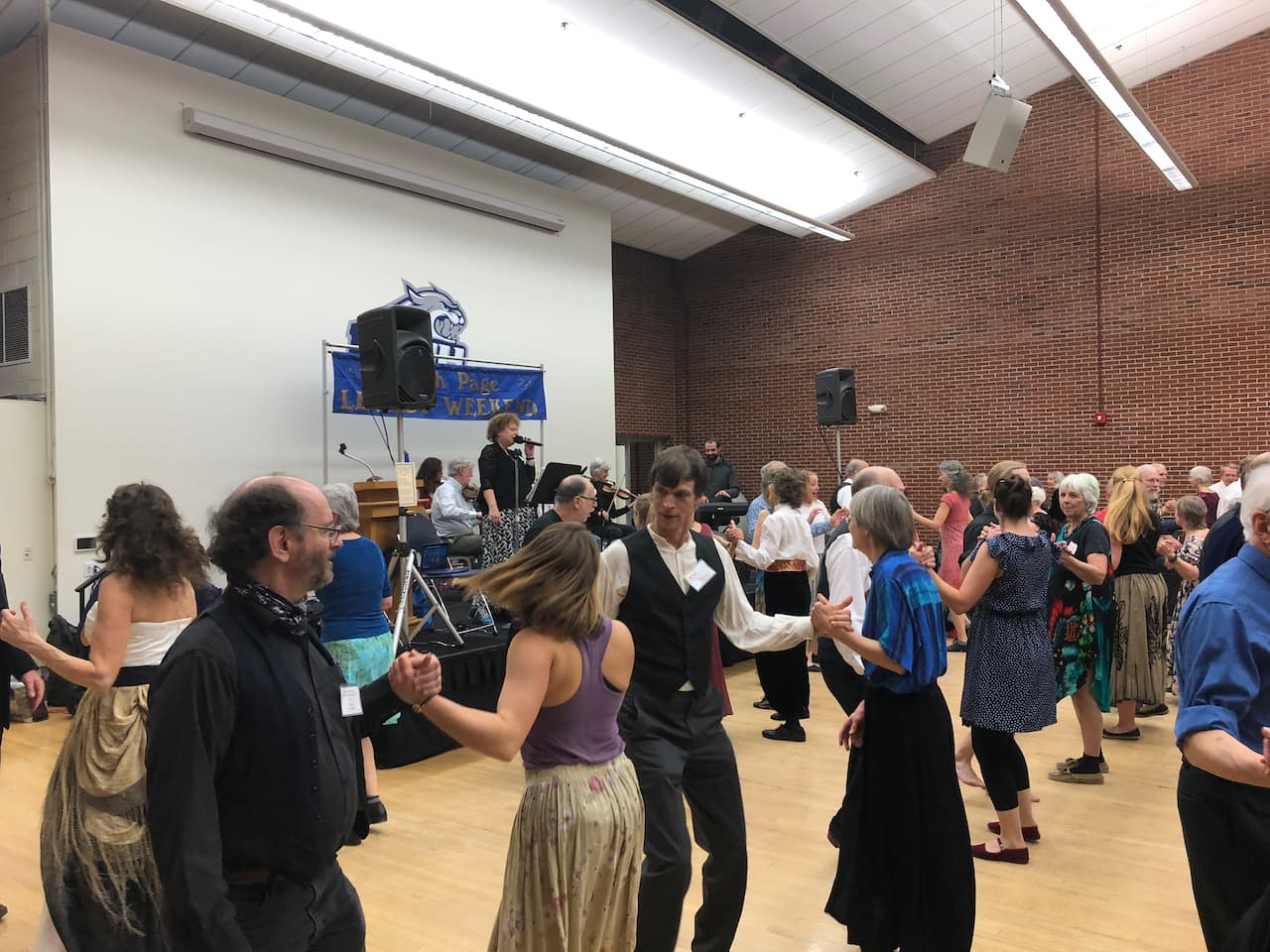
Lisa Greenleaf calling with the Sugar River Band at the 2018 Weekend.
2019 Weekend — Cancelled due to the weather. This was the first time ever to cancel the entire weekend due to the weather, but there wasn't much doubt about it.
2020–present
Ralph Page Dance Legacy Weekend, 2020 to the Present
2020 Weekend. Friday night Bill Olson called with Jordan T-W, David Surette and Sue Hunt. As I remember we were all quite impressed with the music; it was some of the best dance music I've heard in a long time. It was fun, creative, energetic, but with good rhythm and phrasing, and with respect for the tradition. They also played for the remainder of the weekend along with Julie Metcalf, Mark Roberts and Bruce Rosen. Sue Rosen and Will Mentor were the weekend callers. The Retrospective was a tribute to Tony Parkes, who most certainly is deserving of such a tribute.
Although Jordan and band were outstanding, much of the weekend was rather modern in feel.
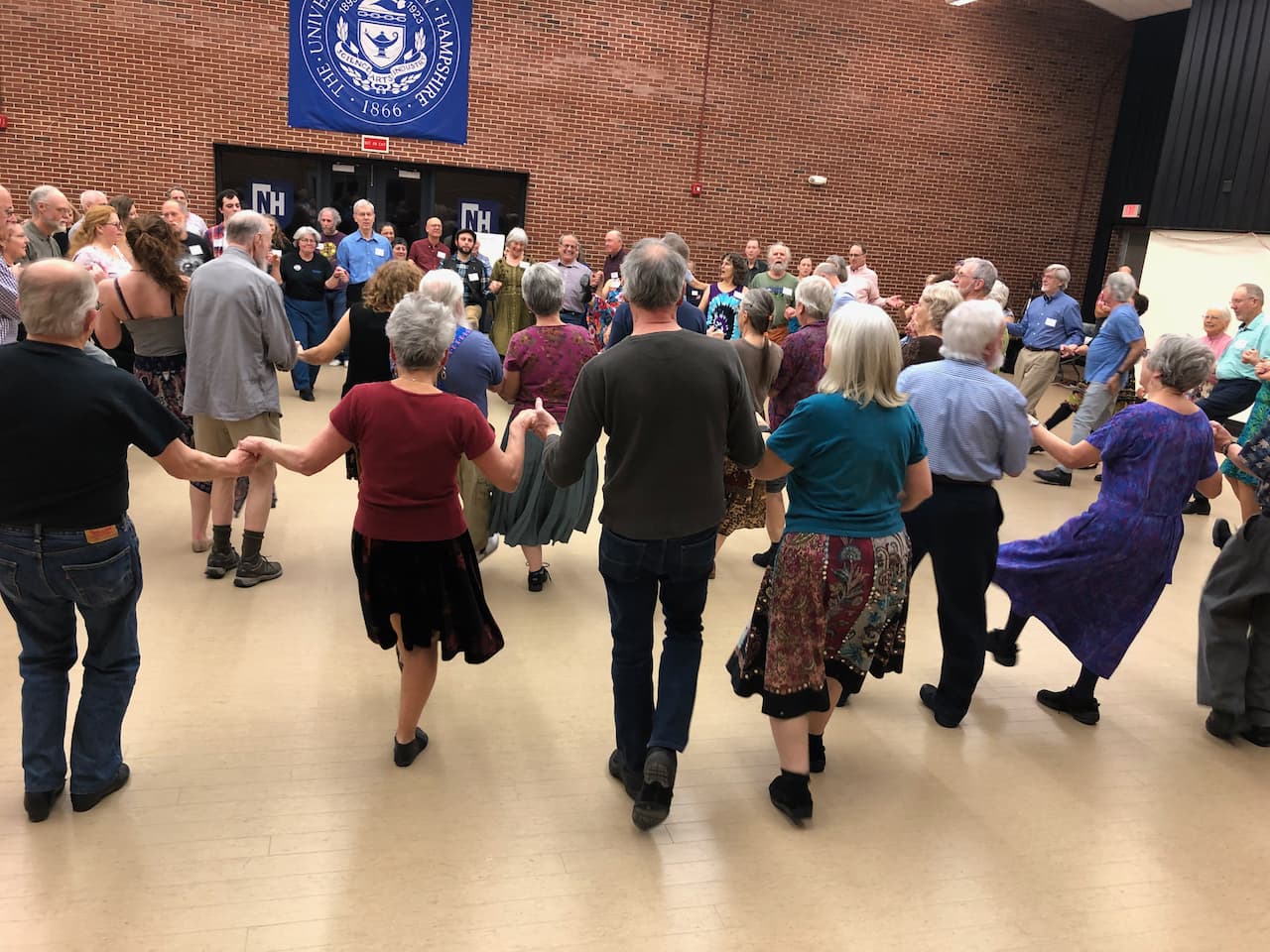
Dancing a circle dance at the 2020 Ralph Page Weekend.
2021 Weekend. This of course was the one at which dancing and meeting in person were out of the question. This year it was a virtual event online on Sunday afternoon. It started with a concert by Keith and Becky at which they played a number of tunes from some of the previous generations of dance musicians such as Dick Richardson, John Taggart and others.
David Smukler and David Millstone did a Cracking Chestnuts session looking at how some of the chestnuts have changed over time. That was followed by a choice of four events. I went to Randy Miller's presentation which featured some very nice music played by Randy and some interesting stories. That was followed by a retrospective talk about Ted Sannella by David & David, and then a virtual Money Musk party. Altogether it was a pleasant event, and probably about right for a virtual version of a largely dance event.
Some Concluding Thoughts. This will remain at the end of the section on the Ralph Page Weekend as more years' programs are discussed.
Overall the Ralph Page Dance Legacy Weekend has been a vey enjoyable event most years. Although it's getting more modern these days it's still distinct in its style and content. It's the only substantial dance event that I know of that explicitly puts an emphasis on traditional dances. Other events largely ignore this repertoire.
There was a time in the 1980s and 1990s when almost no traditional dances were being called anywhere. One notable exception was the Seacoast region of New Hampshire. I think my own calling of chestnuts as well as my promoting them through the Seacoast Country Dance Newsletter made a big difference. But the Ralph Page Weekend was the other factor that kept many dancers in the region interested in those dances.
My impression is that it's more acceptable to call traditional dances in many places than it was 20–30 years ago. I think the Ralph Page Weekend, by exposing dancers from many places to some of the older dances, has been a force in keeping up their popularity. That is especially true as they are generally danced well at the Weekend, and by people who are enjoying dancing them. And the dances are put into a meaningful context, which adds to the effects of the Weekend.
Why the modernization of the Weekend? There are several reasons. Most people on the Committee haven't danced to Ralph Page and for years most have been people who mainly dance older dances at the weekend; so one wouldn't expect them to have as much connection with the older dances. And there are fewer and fewer people available for staff who call that repertoire or who know how to play the tunes in the older style. And of course it's a living tradition, so while it's important to keep up the music and dance traditions, it's important for the Weekend to change too to remain in touch with the dancers.
